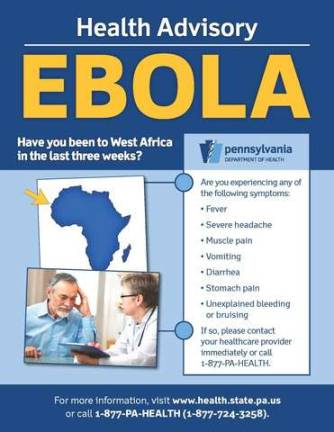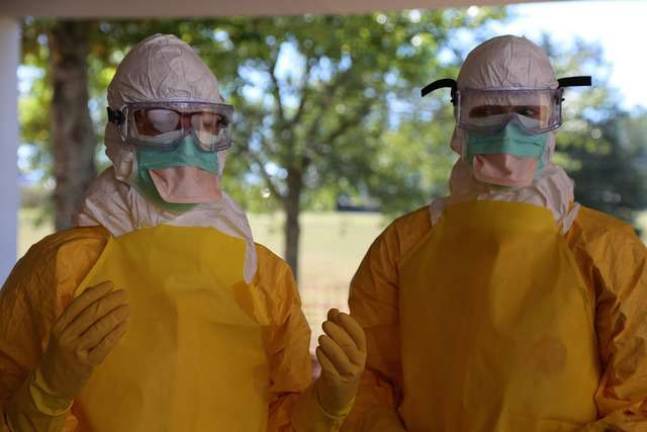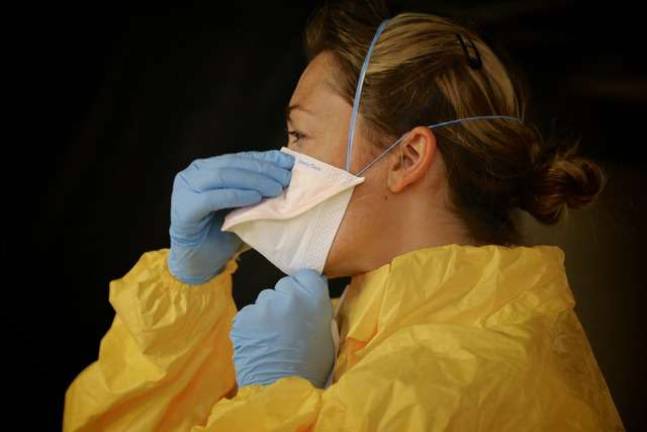Local hospitals prepare for Ebola




By Nathan Mayberg
GOSHEN — Local hospitals are bracing for the possibility they could end up with a patient carrying Ebola, one of the deadliest viruses to threaten the United States in years.
The sense of urgency soared with the announcement Wednesday that a second health care worker in Dallas had fallen ill with Ebola, the second infection contracted in the United States. The federal Centers for Disease Control blamed the first infection on a breach of protocol. But a nurses' union, National Nurses United, said Tuesday there was no protocol to follow — or to breach — at Texas Health Presbyterian, where the two nurses contracted Ebola from a patient under their care. The CDC on Tuesday issued a statement that it is setting up a dedicated response team "that could be on the ground within a few hours" at any hospital in the country that receives a patient with Ebola. The CDC has also launched a campaign to teach health care workers how to stop the spread of infection.
Have you been to West Africa?
Hospitals in the area say they are focused on identifying patients with high fever, nausea, diarrhea, or flu-like symptoms, and who may have traveled to western Africa.
Orange Regional Medical Center in Wallkill has made preparations in the past for outbreaks of communicable diseases such as SARS and the bird flu, said hospital spokesperson Rob Lee. But, he said, Ebola "is certainly more aggressive."
Lee said the hospital will follow the protocol set up by the Centers for Disease Control and Prevention, including how to isolate patients for blood testing if they exhibit symptoms. Every floor of the hospital has an isolation room, he said.
The hospital is now preparing drills on how to handle suspected cases. Signs posted throughout the hospital urge patients to tell their health care providers if they've traveled to other countries, particularly in West Africa. Nurses will also ask patients if they have been in contact with anyone who may have had Ebola, or if they have interacted with an international traveler who may have become ill.
The hospital's leadership is discussing which types of protective gear should be worn by staff when screening patients who may be infected.
Bon Secours Charity Health System is also gearing up. "We are very actively involved in making certain all of our active teams are ready," said spokesperson Deborah Marshall. The system includes St. Anthony Community Hospital in Warwick, Good Samaritan Regional Hospital in Suffern, and Bon Secours Community Hospital in Port Jervis.
Marshall said the hospitals are following CDC screening guidelines, and posting signs instructing symptomatic people to go to the emergency department. Anyone possibly infected with Ebola will be placed in isolation rooms, she said, and staff in contact with these cases will be given protective equipment to wear.
At Wayne Memorial Hospital in Honesdale, spokeswoman Lisa Champau said the hospital is forming a task force. After taking an inventory of its protective gear, the hospital staff believes they are already sufficiently equipped. The hospital will also be holding drills and setting screening protocols.
Flyers have been posted around the hospital from the Pennsylvania Department of Health asking patients if they have been to West Africa or knows anybody who has. If a patient says yes and is experiencing symptoms, technicians will put the patient in one of the two isolation rooms in the emergency department. The protocol for testing patients is still being worked out, she said.
An aggressive response
Dr. Donald Allegra is an infectious disease consultant advising Atlantic Health Systems on how hospitals should be handling their response. Atlantic Health Systems includes Newton Medical Center, Chilton Medical Center and Vernon Urgent Care in Sussex County, N.J.
Allegra said the hospitals are responding aggressively. "We can't take any chances while we are trying to figure out if it's malaria or not," he said.
Staff members have been instructed to do a travel history on anybody who comes in with a fever. Patients who have been to West Africa and have "any symptoms at all" will be put for 21 days into a negative pressure isolation room, which keeps the air from circulating outside the room — although, Allegra noted, the Ebola virus is not transmitted through the air. Blood taken from the isolated patients will be sent overnight to the CDC for testing, he said.
Ebola patients start out with a high grade fever which evolves into vomiting and diarrhea. Atlantic workers treating suspected patients will be fitted with impermeable gowns, eye shields, and non-porous masks.
"It's a flu-like illness," said Allegra.
But Ebola has a much higher death rate than the flu. The World Health Organization said Tuesday that the death rate in the current outbreak is 70 percent.
Taking a lesson from the disaster in Dallas, Allegra said those who treat patients at Atlantic hospitals will be instructed to work together in a buddy system to make sure no protocols are violated.
Complicating matters is the onset of the flu season, which will begin in December. Flu symptoms are similar to the early symptoms of Ebola.
"The travel history is going to be the key here," Allegra said.